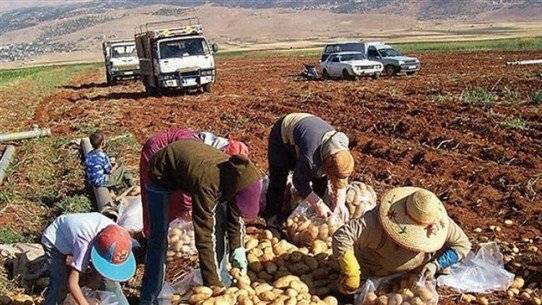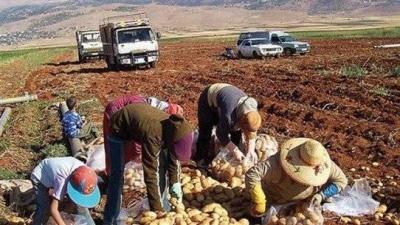The agricultural sector suffers from government neglect and marginalization, significantly impacting those working within it. Besides being a refuge for farmers and aiding the economic shift from rent to production, it also secures income in foreign currency through exports. Encouraging exports, under normal circumstances, supports any economy to achieve self-sufficiency—so how does it fare during crises? Lebanon possesses the essential components to revitalize its agricultural sector, which is vital for creating jobs and reducing poverty and hunger. This sector has been severely affected by the economic and financial crisis in Lebanon, the COVID-19 pandemic, and the repercussions of the Russian-Ukrainian war. Lebanese farmers fear losing foreign markets amid dollar scarcity in the country and the need for foreign currencies, which can be obtained through exports, as local markets are unable to absorb their products, especially after the decline in purchasing power among Lebanese citizens.
**The Necessity of Export!**
"It is a mistake to think that exporting abroad leads to an increase in the prices of local agricultural products," says Ibrahim al-Turshishi, head of the Bekaa Farmers and Agriculture Association, "because only surplus agricultural products are exported after supplying local markets with adequate quantities, which include certain types like apples, grapes, potatoes, bananas, citrus fruits, and some fruits like peaches and pears. All these types are available in thousands of tons, and it is essential to export them to avoid a crop glut crisis. Exporting has become a necessity, even more than ever, to allow farmers to sell their entire production due to the declining consumption rate in the country."
**Obstacles to Land Export**
Al-Turshishi begins by discussing the first problem facing land exports, which is the tax imposed by Syria on every truck carrying Lebanese products to and from, especially since Syrian territory is the main outlet for all land export and import movements and the largest outlet for Lebanon towards the Arab world. This tax poses a burden on Lebanese farmers, leading to a decrease in the competitiveness of these products abroad. The second problem relates to Saudi markets closing their doors to all Lebanese agricultural products, complicating their entry into other territories through Saudi Arabia, meaning trucks can no longer reach Kuwait, Oman, Dubai, and Qatar.
**Obstacles to Maritime Export**
Al-Turshishi notes that sea export constitutes about 90 percent of total agricultural exports, but it also faces several significant issues, the most important being:
- Rising global shipping costs.
- Weak capacity to ship and deliver all goods consistently to foreign markets due to the absence of any clear schedule for ship arrivals, leading to reduced prices and spoilage of some goods abroad due to supply exceeding demand.
Alongside these problems in land and sea exports, the primary issue remains the high production costs in Lebanon. The significant rise in prices for medicines, fertilizers, seeds, and fuel has rendered agriculture economically unviable. Additionally, continued support from the "IDAL" organization for agricultural export is based on 1,500 LBP to the dollar; it previously provided $60 to $70 per ton, sometimes reaching $120 depending on the type of products. Instead of the "container" support reaching $1,000, it has today barely reached $50, a factor that will reduce external competitiveness. Lastly, there is encroachment on the agricultural sector to tarnish the reputation of Lebanese exporters.
**Required Executive Steps**
Al-Turshishi pointed out the agricultural conference held in Beirut, which included the Lebanese Minister of Agriculture Dr. Abbas al-Haj Hasan and agriculture ministers from Syria, Jordan, and Iraq, carrying a series of positives and solutions to some obstacles facing agricultural export paths to these three brotherly countries. "However, there are some essential and necessary matters that were not agreed upon," according to al-Turshishi, including:
- Allowing Lebanese trucks entry to Iraqi territory by land, similar to other Arab countries that have access to all Iraqi internal markets, without the Iraqi side imposing that Lebanese trucks unload at the border, in addition to the absence of an agricultural calendar in Iraq.
- The tax imposed by Syria on every truck carrying Lebanese products back and forth.
Al-Turshishi concluded by saying, "We are waiting for the meeting scheduled for September to bring additional executive and tangible steps to be implemented on the ground. State intervention in this area is essential to achieve economic growth and liberate the country from poverty, hunger, and unemployment. Investing in the agricultural sector and supporting the export of its products reduces unemployment rates, thereby creating job opportunities and contributing to competitive ability, making local goods competitive against products in foreign markets. So why is this sector still far from the priorities of the Lebanese state?"




